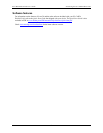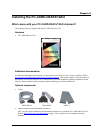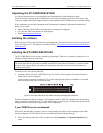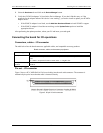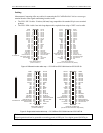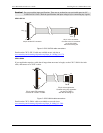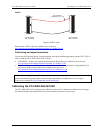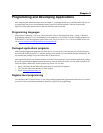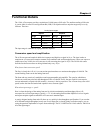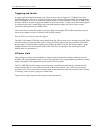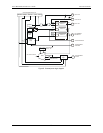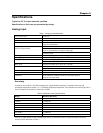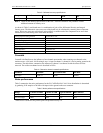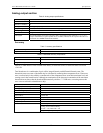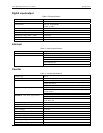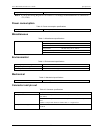
Chapter 4
Functional Details
The 12-bit A/D converter provides a resolution of 1/4096 parts of full scale. The smallest reading of full scale
(1 part in 4096) is called a Least Significant Bit (LSB). Four bipolar and four unipolar ranges may be set by
software. These are:
Analog input ranges
Bipolar Unipolar
Range Resolution Range Resolution
±10 V 4.88 mV 0 to 10 V 2.44 mV
±5 V 2.44 mV 0 to 5 V 1.22 mV
±2.5 V 1.22 mV 0 to 2.5 V 0.61 mV
±1.25 V 0.61 mV 0 to 1.25 V 305 µV
The input range is controlled by a programmable amplifier.
Conversion speed and amplification
The A/D converter and sample & hold circuit captures and digitizes a signal in 10 µs. The time it takes to
complete an A/D conversion remains constant in all conditions and at all throughput rates. When you request a
sample rate of say 20 kHz, the A/D converter is still converting the signal in 10 µs. The 20 kHz rate comes
from the fact that conversions are being initiated only every 50 µs.
What factors limit conversion speed?
The first is clearly the A/D. A 10 µs conversion speed translates to a maximum throughput of 100 kHz. The
second limiting factor can be the analog front end.
The front end may consist of a multiplexer and a programmable gain amplifier. The speed at which these
circuits can switch may also limit the throughput of the A/D board. That is, the rate at which it can acquire,
convert and transfer a signal with full accuracy. Accuracy is the key term here. The A/D can always run at full
speed, but has the front end settled and captured a true, accurate signal?
What about input range vs. speed?
Here is where the design of the analog front end is critical to maintaining total throughput. Most A/D
converters have a fixed input range, typically +/-5V. It is the analog front end that amplifies low level signals
and adjusts unipolar signals to match the A/D converter's standard input.
A poorly designed analog front end will show up very quickly in the throughput specifications. If you see that
an A/D board has high throughput in only one or two ranges but is slowed greatly at all other ranges, you are
seeing the practical implications of a poor front end design. The PC-CARD-DAS16/12AO achieves 100 kHz in
all of the eight ranges.
17



